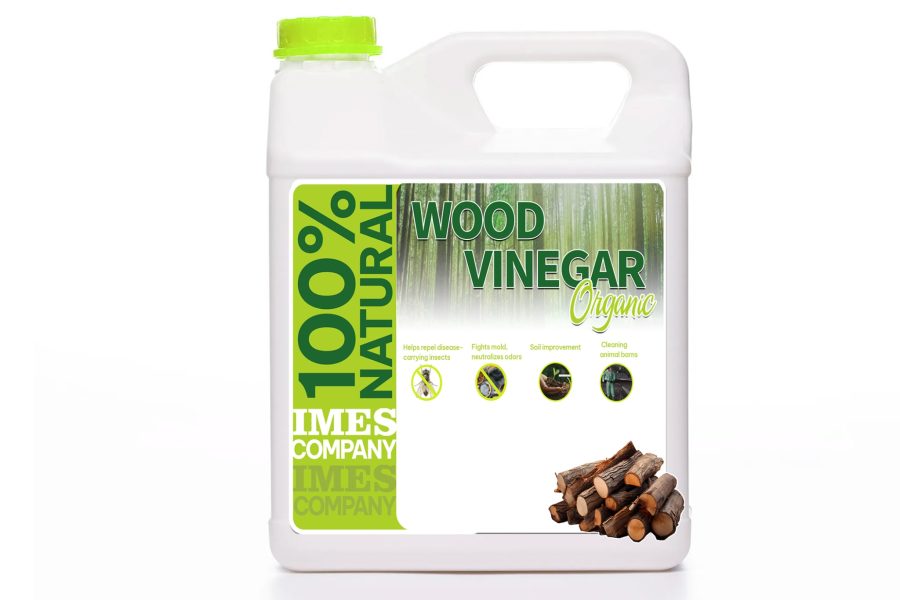Commonly used as an organic pesticide, soil conditioner, animal feed additive, air quality improver for barns, and a growth stimulant for plants/seeds.
Output: 12,000 tons/year
Wood vinegar – a multi-purpose biological solution: organic pest control, soil improvement, animal feed supplement, and sustainable plant growth promotion.

Detailed Description:
1. General Introduction
Wood vinegar, also known as natural wood vinegar or pyroligneous acid, is a dark brown liquid extracted during the pyrolysis of wood or agricultural by-products such as bamboo, rice husks, cashew shells, coconut shells, etc. It is an intermediate product recovered from the smoke and vapor generated when burning organic materials in an anaerobic condition.
With a stable output of 12,000 tons/year, wood vinegar supplied by IMES is now widely applied in various fields such as organic agriculture, animal husbandry, environmental treatment, and biotechnology.

2. Composition and Technical Specifications
Wood vinegar contains over 200 bioactive organic compounds, primarily including:
- Acetic acid (3–7%): provides antibacterial, antifungal properties and improves soil.
- Methanol, acetone, phenol, ketones, and natural esters: help control insects and promote plant metabolism.
- Minerals and trace elements: help improve plant resistance.
Wood vinegar has a mild smoky odor, is weakly acidic, and can be diluted with water before use in agriculture or industry.
3. Key Applications of Wood Vinegar
3.1. As an Organic Pesticide
Wood vinegar is an ideal alternative to chemical pesticides. When diluted and sprayed on leaves or soil, it:
- Repels insects and pests (thrips, aphids, slugs, ants, etc.).
- Inhibits fungal diseases such as Fusarium, Pythium, and Rhizoctonia.
- Is safe for humans, pets, and leaves no residue in the soil or on agricultural products.
3.2. Soil Conditioning and Growth Promotion
Wood vinegar helps to:
- Adjust soil pH, reducing alkalinity or slightly acidifying it for better nutrient absorption.
- Increase the activity of beneficial microorganisms in the soil, supporting organic decomposition.
- Stimulate root, stem, and leaf growth, helping plants grow faster and stronger.
3.3. Stimulating Germination and Increasing Yield
When soaking seeds in a diluted wood vinegar solution, its bioactive compounds will:
- Activate germination enzymes, promoting faster and more uniform seed sprouting.
- Increase the germination rate and vitality of seedlings. Periodic spraying of wood vinegar also helps to increase crop yields, especially for leafy vegetables, fruit trees, rice, and corn.
3.4. Application in Animal Husbandry
Wood vinegar is used in:
- Production of feed supplements for livestock, poultry, and aquaculture: improves digestion, boosts immunity, and reduces manure odor.
- Barn odor control: sprayed directly on floors or in pens to reduce ammonia, kill bacteria, and purify the air.
- Natural prevention against disease-causing bacteria and viruses, without using antibiotics.
3.5. Industrial and Environmental Applications
Wood vinegar is also used in:
- Treatment of organic wastewater from food and seafood processing plants.
- An intermediate in the production of bio-fertilizers and bio-pesticides.
- A natural wood preservative to protect against termites and pests without using toxic chemicals.

4. Outstanding Advantages of IMES Wood Vinegar
- 100% clean raw materials from agricultural by-products, no synthetic substances.
- Modern pyrolysis process, ensuring pure extraction without hazardous impurities.
- Composition is regularly tested, ensuring safety for use on crops and animals.
- High efficiency – low cost compared to traditional chemical pesticides and antibiotics.
5. Instructions for Use
Wood vinegar can be used effectively in various fields; the dilution ratio depends on the specific purpose.
- For pest control: Dilute with water at a ratio of 1:100 to 1:200 and spray evenly on leaves in the early morning or late afternoon.
- For soil improvement: Dilute at a ratio of 1:200 to 1:300 and apply directly to the soil or mix with compost.
- For seed soaking: Dilute at a ratio of 1:300 to 1:500 and soak for 3-6 hours before sowing.
- For livestock barns: Dilute at a ratio of 1:50 to 1:100 to spray directly on the barn floor to deodorize and disinfect.
- As a feed additive: Use 1-2 ml per kg of feed to enhance digestion and natural resistance.
6. Role in Sustainable Agricultural Development
Wood vinegar is a crucial link in the ecosystem of organic and circular agriculture. Using wood vinegar helps to:
- Reduce dependency on agricultural chemicals.
- Increase soil fertility and improve the quality of produce.
- Contribute to reducing greenhouse gas emissions and improving air and water quality.
Especially in the context of climate change and environmental crisis, wood vinegar is a strategic choice for farmers to increase productivity while protecting the ecosystem for the long term. Wood Vinegar is not just a by-product of biomass pyrolysis but a comprehensive biological solution for agriculture, animal husbandry, and the environment. With an output of 12,000 tons/year and tested quality, IMES Wood Vinegar is a reliable choice for all green production and sustainable development needs.

